- Home
- Maya Angelou
Hallelujah! The Welcome Table: A Lifetime of Memories With Recipes Page 8
Hallelujah! The Welcome Table: A Lifetime of Memories With Recipes Read online
Page 8
¼ cup chopped fresh parsley
Dust veal with flour, and in large sautê pan brown quickly on both sides in 1½ tablespoons butter mixed with oil. Remove veal, and season with salt and pepper. Keep warm.
Sautê mushrooms until soft. Cover with ¾ cup wine, and continue cooking until the wine is reduced to half.
Add veal to mushrooms on medium heat. After 5 minutes remove veal to a hot platter.
Add the remaining wine to the pan. Add remaining butter. Bring to a boil, and then simmer for 4 minutes. Add parsley, and pour over the meat. Serve with steamed white rice.
Pâté
SERVES 8
2 pounds goose or duck or chicken livers
1 teaspoon salt
½ teaspoon freshly ground black pepper
All-purpose flour
12 tablespoons (1½ sticks) soft butter
½ pound ground veal
1 cup diced onions
¼ teaspoon ground cinnamon
¼ teaspoon ground nutmeg
½ cup Rémy Martin cognac
1 cup chicken stock
Preheat oven to 350°F. Liberally butter 9 × 3-inch loaf pan.
Clean livers of all veins, gristle, and fat. Season with salt and pepper, and dust with flour.
In large sautê pan, melt 4 tablespoons (Y2 stick) butter, and place veal and livers in pan. Sautê on medium heat until done. (When no blood comes from the veal and livers, they are done.) Cool, and remove from pan to warm plate.
Put remaining butter into pan. Melt, and add onions. Sautê on medium heat until translucent. Let cool.
Puree livers, veal, and onions. Mix in cinnamon, nutmeg, and cognac, then chicken stock.
Pour mixture into loaf pan. Bake 30 minutes. Remove and cool. Place in refrigerator with another loaf pan holding two 15-ounce cans vegetables on top of pate for 24 hours (to remove any air pockets in the baked mixture). Slice and serve cold.
Molded Eggs Polignac
SERVES 6
9 teaspoons butter, plus more for toast and garnish
6 truffle slices
6 large eggs
6 buttered toast rounds
2 teaspoons finely chopped fresh parsley
Preheat oven to 350°F.
Melt 1½ teaspoons butter in each of six small molds or ramekins. Lay a slice of truffle in the bottom of each mold. Break an egg into each mold, and set the molds in a pan of hot water. Bake for 8 to 10 minutes, or until the whites are set and the yolks a little soft.
Remove the molds from the hot water and let the eggs and truffles cool for a few minutes. Unmold each egg and truffle onto a small round of buttered toast, and garnish with melted butter and parsley.
THE LONDON DRAWING ROOM glowed beneath subdued lighting. Antique furniture showed its age gracefully, and our hostess, Sonia Orwell, was what she wanted to be: a picture of an upper-class hoyden.
I was introduced to the guests and told that they were great artists. One painter was the grandson of a famous psychiatrist, another painter had the same name as a renowned eighteenth-century English writer, and yet another was a trendy painter-photographer. Sonia shook her mane of blond hair and told them that I was writing a book.
The men gathered around me and asked pointed questions that seemed at odds in such amiable quarters.
“What on earth do you find in London that you don’t have in the States?” “Why do you come to England to write?”
“You can’t escape racism, you know. English say all wogs begin at Calley.”
True, I didn’t know from his accent that his Calley meant the French town Calais, nor at that time did I know that the word wog meant “nigger, ” but I knew they were being hostile to me, so I responded in kind.
“I wanted to be in familiar surroundings. And you’ve just shown me there are as many ignoramuses here as there are in the United States. I didn’t come here looking for anything. I brought everything I need with me. I know it is more blessed to give than to receive, so I’m willing to donate some of my wit to those who need it so badly.”
Sonia shook her hair and said, “You’ve found a match! ”The men laughed at my retorts.
We had become fairly friendly by the time we were asked to come downstairs to dinner.
We sat at a beautiful table festooned with personal nosegays at each plate.
The first course was an onion tart. I had never tasted anything better. I chewed slowly, registering each flavor. The shortness of the crust backed up the sweetness of caramelized onions. Voices intruded into my reverie.
“Maya, yes, Maya, what do you think of contemporary composers?”
“Yes. Like John Cage?”
I said, “Well, for me the emperor has no clothes. I think he is an impostor.” Each artist, and even Sonia, began to shout at me. “You can’t call John Cage an impostor.”
I remembered fifteen years earlier being an impoverished dancer. I saved every penny of my money so that I could attend a John Cage concert. I sat happily in the cheapest seat waiting for the artist so many people held as one of the important figures of twentieth-century art.
John Cage and a stagehand appeared carrying a record player. They plugged it into a socket and left the stage.
As the audience waited, there was a click and after a few seconds there was another click. Then another click. And another click.
I looked at the program and it read something like “Traffic Light at the Corner of Sixty-fifth and Park Avenue.”
I left the theater hurriedly, pushing myself past people who were rapt in ecstasy over the sound of a traffic light clicking.
On the street, I was spitting mad. I had given up too many slices of pizza and ice-cream cones and subway rides to be so insulted.
I repeated at Sonia’s table, “Yes, I think he is a charlatan and a poseur.”
The company looked at me with disgust.
“Obviously conversation with you will be impossible.”
“Anyone ignorant enough to call Cage a poseur is too ignorant for social exchange.”
“Where did you find her, Sonia?”
Sonia came out of the kitchen carrying a tray that held a beautiful roast pork and baked apples. I stood up.
“Thank you, Sonia. I realize I have to be in Bangkok in half an hour.” She followed me upstairs and to her front door.
“Maya, they really like you. They think of you as an equal or they wouldn’t have talked that way.”
“I will never be their equal and they will never be mine.”
I walked down her front stairs and into the London night.
I could have kicked myself for having wasted an evening. Then I thought I didn’t really waste the evening. I did meet up with a great onion tart, and I had had the time to linger over it. And (I hoped) I could solve its mystery.
Onion Tart
SERVES 6
4 cups thinly sliced onions
3 tablespoons butter or bacon fat
2 cups heavy cream
3 large eggs, slightly beaten
1½ teaspoons salt
¼ teaspoon paprika
¼ teaspoon pepper
⅛ teaspoon ground nutmeg
9-inch pie shell, baked
Preheat oven to 450°F for 10 minutes.
Sautê onions in butter or bacon fat slowly until soft and golden.
Cool to room temperature. Add cream, eggs, salt, paprika, pepper, and nutmeg to onions, mix well, and turn into pie shell.
Bake for 10 minutes. Then reduce heat to 350°F, and bake for 30 minutes longer, or until knife blade inserted in the tart comes out clean.
IN THE MID 1960S, Los Angeles was friendly but unfocused for me. Thanks to Frances Williams, whom I had known years earlier, I had a place to stay but no job, and my money was slipping away.
I had sounded like a dunce at the employment agency.
The young, serious social worker asked, “What was your last job?”
“I sang calypso and blues in a supper club.”
Sh
e made notes and then asked, “Where was that?”
“In Oahu, Hawaii, Waikiki.”
Her eyes opened. “Why did you stop?”
“I realized I don’t sing very well.”
She caught a breath. “Ahem, okay. What did you do before that?”
“I was an administrative assistant at a university.” “Oh.” For a moment she found relief. “So, you can type?” “No, but I can file.”
The relief vanished. “At what university did you work?” “At the University of Ghana in West Africa.”
The interviewer let the pencil fall from her fingers. “I don’t have anything for you. You may be unemployable.”
As was to be expected, Frances Williams knew someone who could offer me a job. She asked if I could cook.
I said, “I cook very well.”
She asked, “Southern?”
I said, “Of course, but I don’t really want a job as a cook.”
She said, “No, that’s not the job I’m looking at for you. Let me tell you about Phil, who handles random research systems for large companies like Kellogg’s and General Foods and Ivory Soap.”
She said Phil had a publicity agency and was a good ole white boy from the South. He was so homesick that he would break down and cry if you mentioned fried chicken.
She said she would invite him to her house, and if I made a southern brunch, she was pretty certain he would give me a job. She asked, “Are you sure you can cook? I can’t help you because that would be lying and lying won’t help anybody in the end, and I tell the truth. Tell a lie and you’ll never be finished scheming.” That was Frances Williams’s motto.
She offered to buy the brunch ingredients and said she’d call Phil and a few other friends so he wouldn’t feel set up.
I said, “But we are setting him up.”
“Not at all, ” she said, “unless you want to think I’m setting you up. Here’s how I see it. My friends and I are going to find out if you can really cook. If so, and you cook southern, Phil is going to think he’s waking up in a dream and you’ll get a job. Friends of mine who haven’t seen me or each other in months will have a great time.”
I made a list for her. She asked, “No grits? You’ll have a southern breakfast without grits?”
I said, “They won’t be missed.”
On Sunday morning, I went early to Frances’s kitchen, and when everyone arrived I was sitting calmly in the living room, which was alive with the aromas of sage and caramelized brown sugar.
Frances introduced me to Phil. “She’s just come from Africa.” His face was a mask of disinterest. “But she’s from the South.” A little interest awakened his features.
“From where?”
I said, “A little hamlet in Arkansas, twenty-five miles from Texarkana.” He gave me a smile grudgingly. “You miss it, don’t you?”
Frances spoke before I had to lie. “She’s out here looking for a job, and she’s so sweet she came over here and made our brunch. The whole thing.” I had his full attention. “What did you cook?” I said, “Sausage and eggs.” He asked in a little boy’s voice, “And grits?”
I said, “No, ” and the smile slid down to the floor. I quickly added, “I made spoon bread.”
“Spoon bread. You said spoon bread? I haven’t had spoon bread since I left Birmingham.”
Seeing him so pleased delighted me. I added, “I make my own sausage, and we’ll also have fried apples and homemade biscuits.” His smile was so winning I could have hugged him.
Brunch was offered buffet-style. After Phil served himself, he sat alone on a window seat. I watched as his eyes visited each item on his plate. Only after he assured himself that he had seen what he thought he had seen did he begin to eat. He would put a forkful of food in his mouth and then he would seem to disappear. He slowly chewed his way back to his Alabama childhood.
Later I saw Frances and him talking out on the patio. When they came in, he headed straight to me.
“You can start on Monday. It doesn’t pay much, but it’s easy work. Fran says you are a writer. I just want you to give me your recipe for spoon bread and for biscuits and for sausage. Oh yeah, and for fried apples, too. Well, if you can write half as good as you can cook, you are going to be famous.”
Spoon Bread
SERVES 6 TO 8
2 cups white cornmeal
1 cup all-purpose flour
4 teaspoons baking powder
2 teaspoons salt
1 ½ cups cold water
1 cup boiling water
2 tablespoons (¼ stick) butter, melted
2 large eggs, beaten
1 ½ cups milk
Preheat oven to 375°F. Butter a 2-quart casserole dish.
Sift together cornmeal, flour, baking powder, and salt. Stir in cold water. Add boiling water, and stir vigorously. Add remaining ingredients, and mix well. Pour into casserole dish. Bake for 1 hour, or until firm and browned. Serve at once.
Fried Apples
SERVES 6
6 Granny Smith apples
2 Mcintosh apples
4 tablespoons (½ stick) butter
2 tablespoons brown sugar
1 cup water
½ teaspoon ground cinnamon
¼ teaspoon ground nutmeg
Quarter and core apples, but do not peel. Melt butter in large frying pan, and place apples skin side down in pan. Sprinkle with brown sugar, and add water. Add cinnamon and nutmeg, cover, and cook very slowly over low heat until tender and candied. Eat hot.
Homemade Biscuits
MAKES I DOZEN BISCUITS
3 cups all-purpose flour
5 teaspoons baking powder
½ teaspoon salt
½ cup Crisco shortening
1 cup milk
Preheat oven to 350°F.
Sift flour, baking powder, and salt together. Cut in shortening until mixture resembles coarse cornmeal. Add milk, using more if needed, to make a soft dough.
Roll out dough on floured board to ¾ inch thickness. Cut into 2-inch rounds. (If biscuit cutter is not at hand, use water glass dipped in flour.) Bake on well-greased cookie sheet for 25 minutes (longer if you want them browner).
Sausage
SERVES 6
2 pounds raw pork
¼ pound pork fat
2 teaspoons salt
1 teaspoon sage
1 teaspoon red pepper flakes
1 teaspoon freshly ground black pepper
Grind pork with pork fat. Mix salt, sage, red pepper flakes, pepper, and ground meat. Using 2 heaping tablespoons of meat each, roll into balls, then flatten. Fry in medium-hot skillet until no blood is visible.
JESSICA MITFORD, WHO WAS CALLED DECCA, was a Briton transplanted among the hoi polloi in Oakland, California. To be more precise, Decca Mitford was an English aristocrat who once chose to become a card-carrying member of the Communist Party and live in a working-class town in northern California.
She and her lawyer husband, Robert Treuhaft, later left the party because they concluded that the organization was reneging on some of the high and lofty political and ethical ideals that had first appealed to them.
Bob and Decca lived in a commodious, rambling 1920s California bungalow, where they entertained celebrities and others, from the legendary blues singer Leadbelly to the odd felon on the run.
Bob was always the cook, specializing in the very best Boston baked beans, duck pâté, and butterflied roast leg of lamb. Decca mostly tidied up.
Decca and Bob’s group was planning a large gala, and as preparatory chores were appointed most people thought Decca couldn’t be much help in the kitchen, so she was asked to order the chickens, which more experienced members would then cook.
Decca telephoned the number she had been given for the chickens. “I’d like to order fifty frying chickens to be delivered to a social hall on Wednesday at ten o’clock A.M.”
“Do you want them dressed or undressed?” She said, “Undressed of course.”
&
nbsp; Decca told me, “You must know that banqueting is also a part of the struggle.” She went to the meeting hall on Wednesday and was utterly shocked to see fifty chickens delivered with feathers, heads, necks, and feet attached.
She shouted at the deliverymen, “Why do they have all these things on them? I told you I wanted them undressed.”
She was informed that in poultry parlance undressed meant with all the things on them and in them.
Decca called headquarters and told her story. She asked if there were any communists who knew how to dress a chicken.
Within an hour, chicken pluckers and cleaners were at the hall. They immediately began defeathering and disemboweling the chickens. When Decca saw the amount of work that was necessary, she was stricken with gratitude. No one had ever seen her so apologetic.
“Listen, I’m very sorry. And all of this brought about by my saying undressed rather than dressed.”
One of the pluckers said, “You couldn’t have known, Decca. You speak English. We speak American. We also speak poultry. What you do, you do so well. You deserve to take one of these chickens home fully dressed.”
She accepted the chicken. She brought it home and opened a bottle of white wine, and quickly drank one half. Without benefit of recipe, she began to cook. She put the chicken into a casserole pot along with celery, onions, seasoning, and the rest of the wine.

 All God's Children Need Traveling Shoes
All God's Children Need Traveling Shoes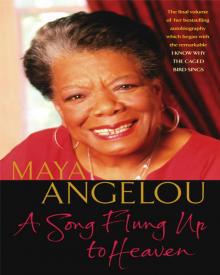 A Song Flung Up to Heaven
A Song Flung Up to Heaven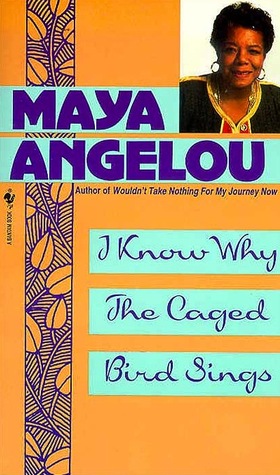 I Know Why the Caged Bird Sings
I Know Why the Caged Bird Sings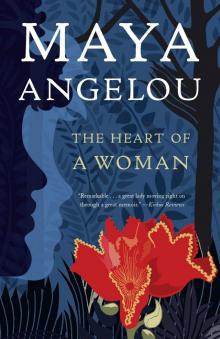 The Heart of a Woman
The Heart of a Woman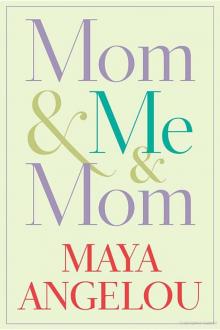 Mom & Me & Mom
Mom & Me & Mom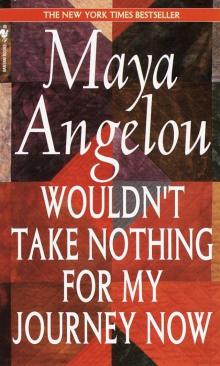 Wouldn't Take Nothing for My Journey Now
Wouldn't Take Nothing for My Journey Now Singin' and Swingin' and Gettin' Merry Like Christmas
Singin' and Swingin' and Gettin' Merry Like Christmas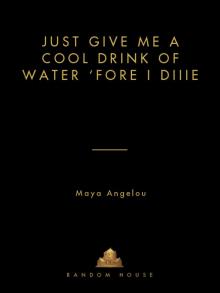 Just Give Me a Cool Drink of Water 'Fore I Diiie
Just Give Me a Cool Drink of Water 'Fore I Diiie The Collected Autobiographies of Maya Angelou
The Collected Autobiographies of Maya Angelou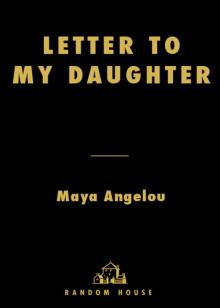 Letter to My Daughter
Letter to My Daughter Celebrations: Rituals of Peace and Prayer
Celebrations: Rituals of Peace and Prayer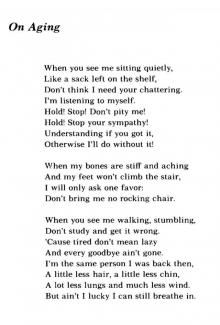 The Complete Collected Poems
The Complete Collected Poems Even the Stars Look Lonesome
Even the Stars Look Lonesome Hallelujah! The Welcome Table: A Lifetime of Memories With Recipes
Hallelujah! The Welcome Table: A Lifetime of Memories With Recipes The Complete Collected Poems of Maya Angelou
The Complete Collected Poems of Maya Angelou Celebrations
Celebrations